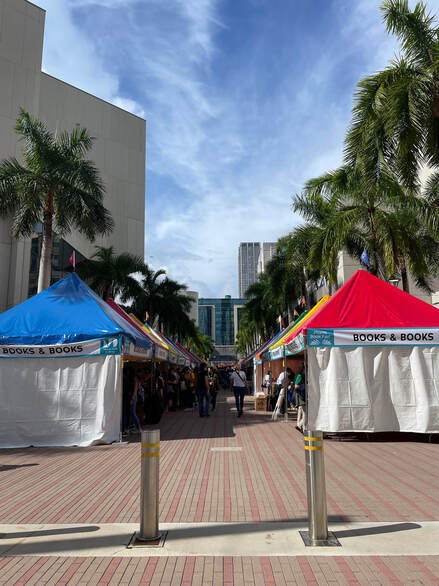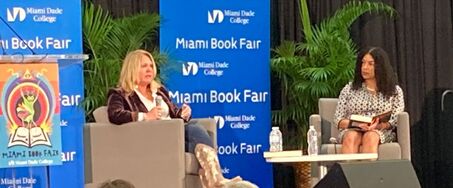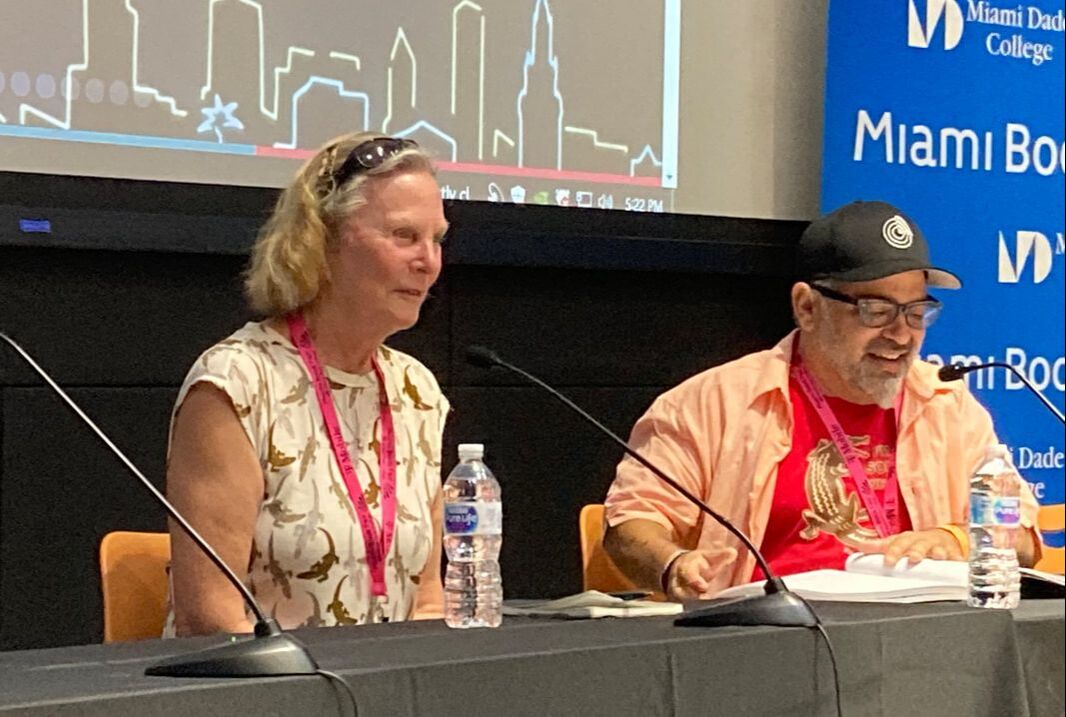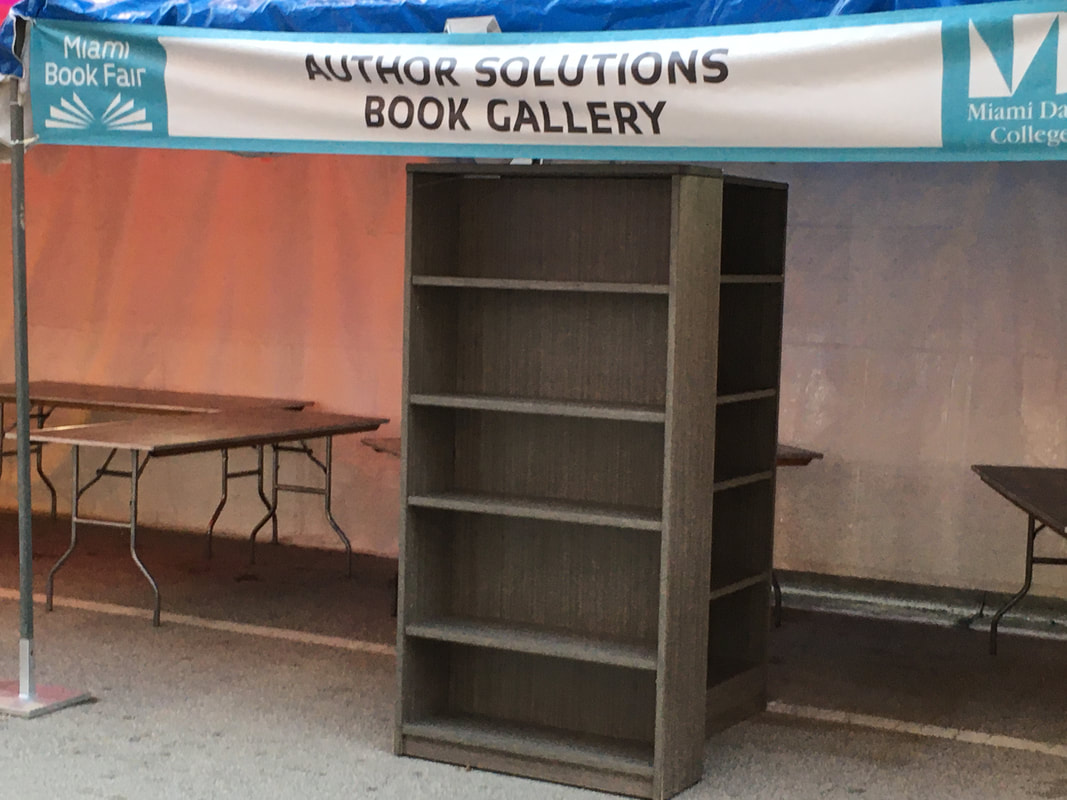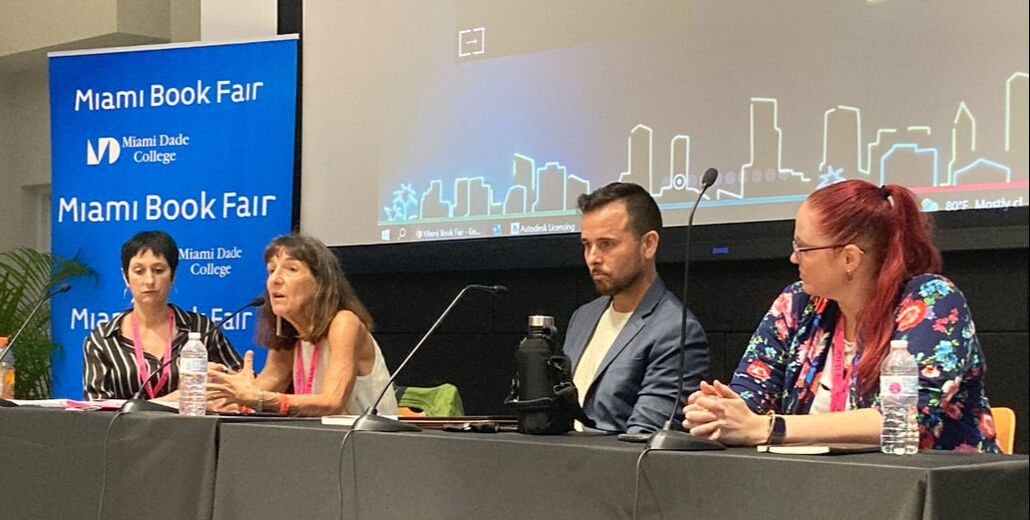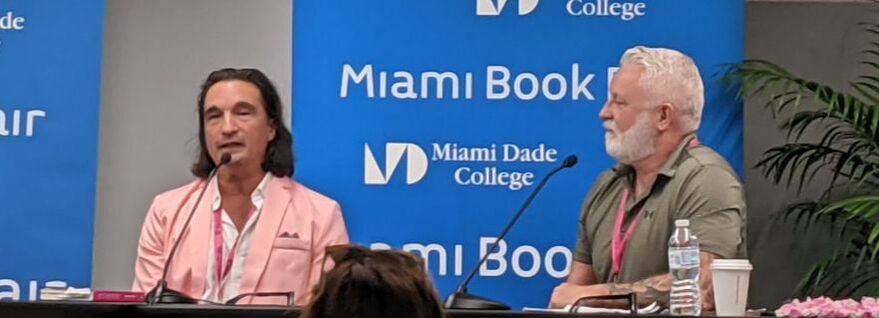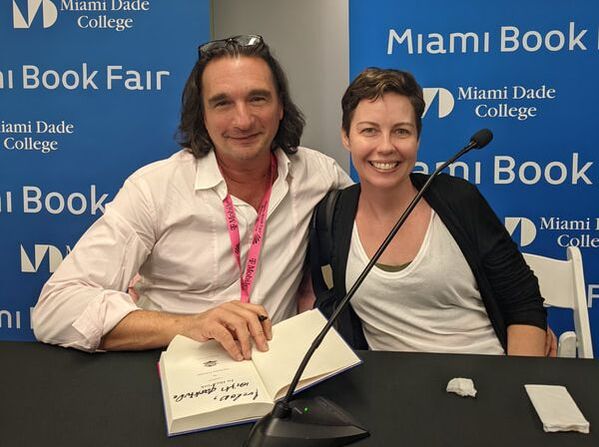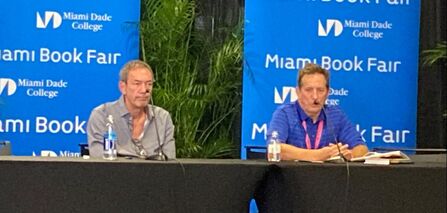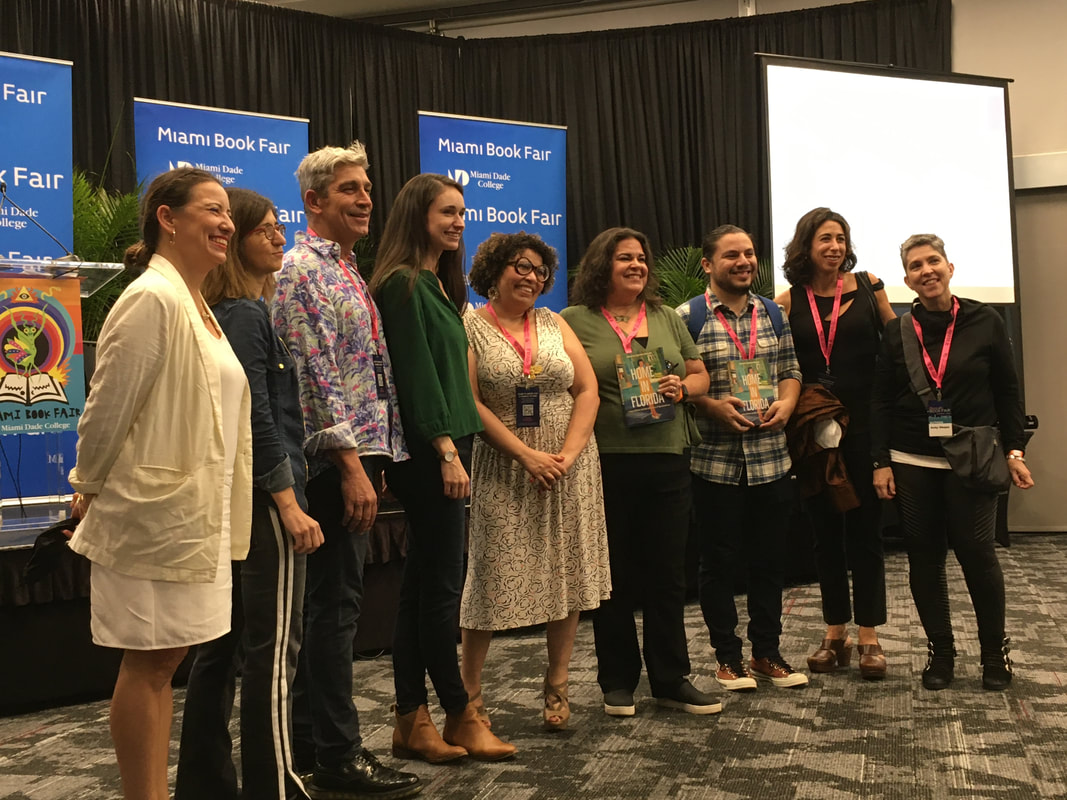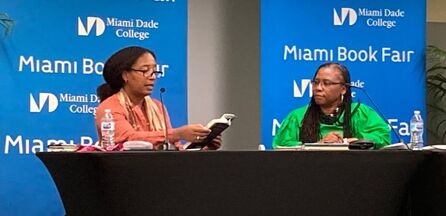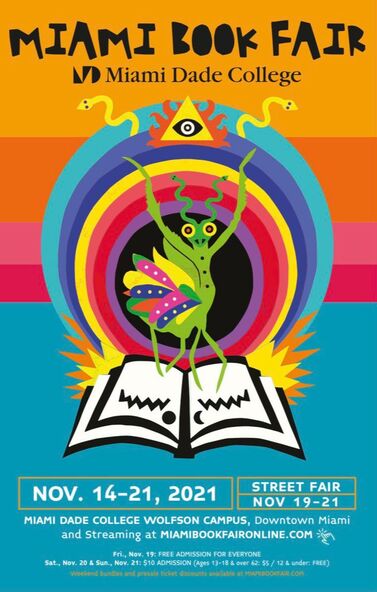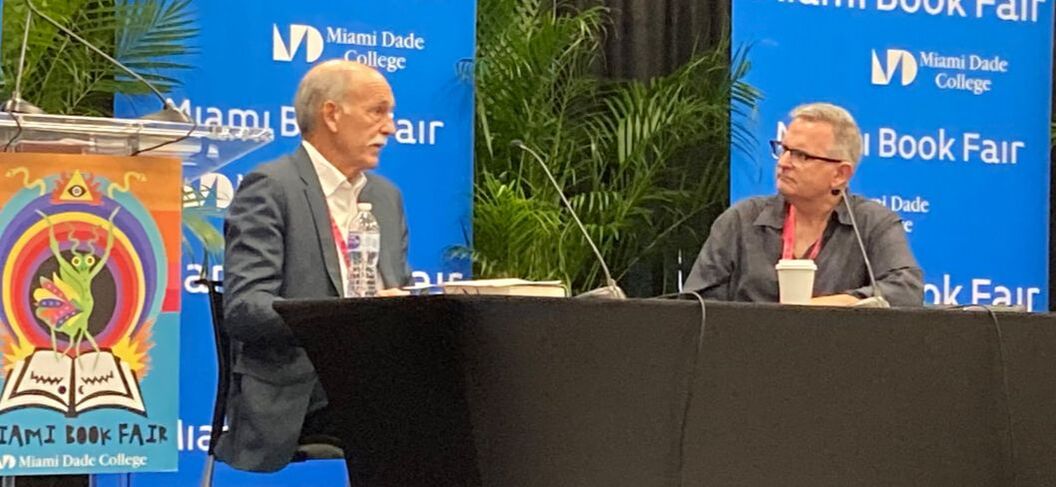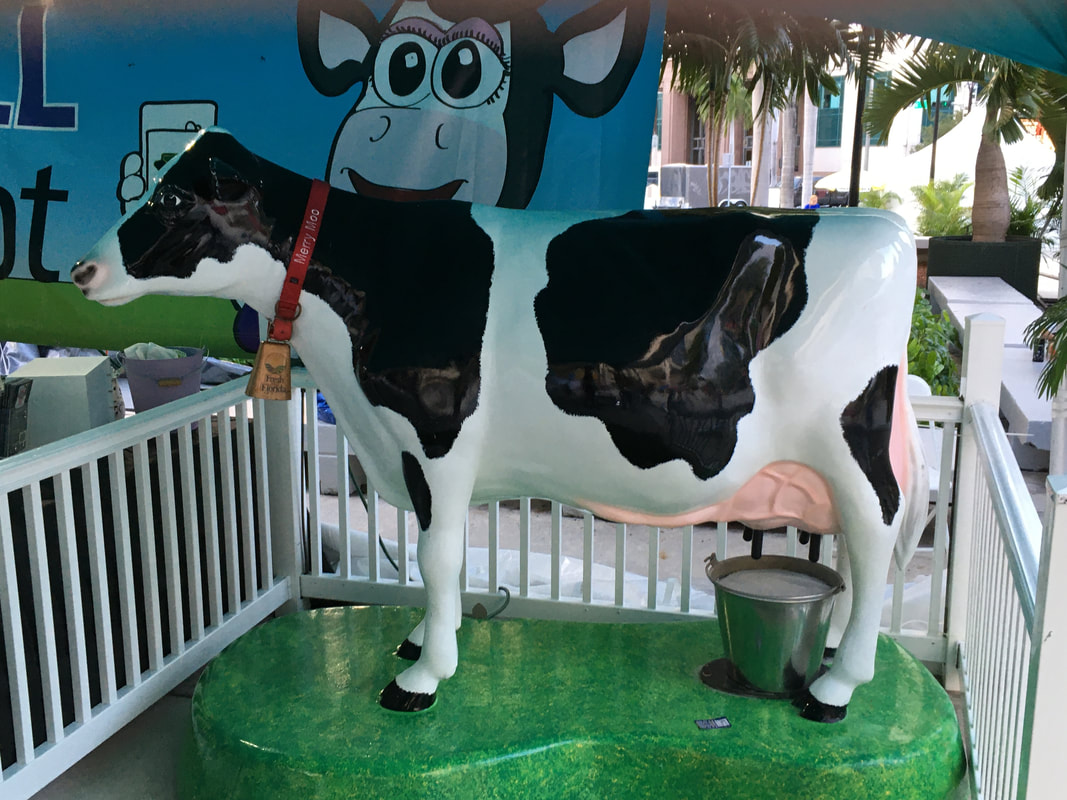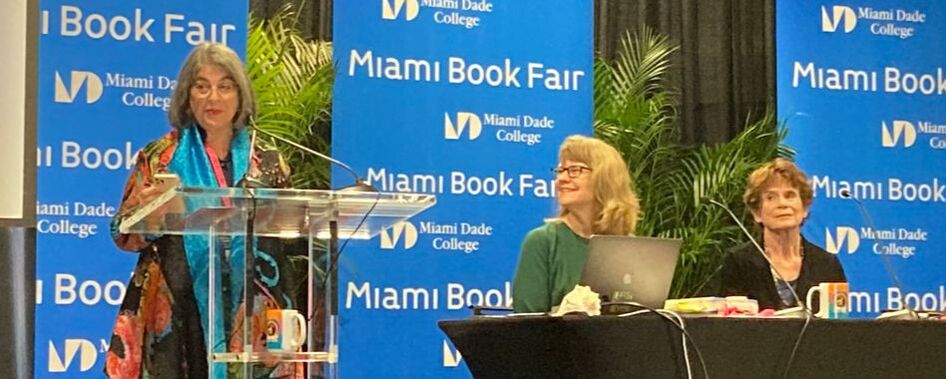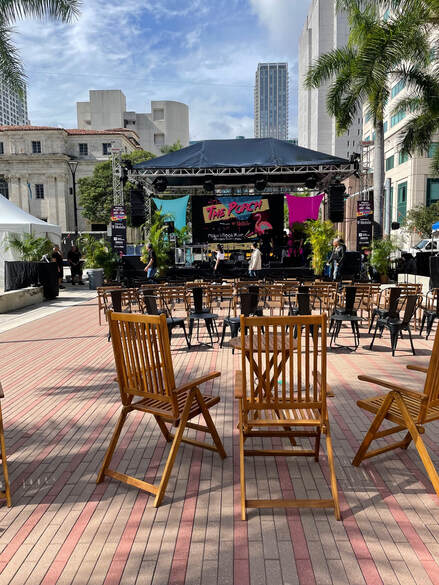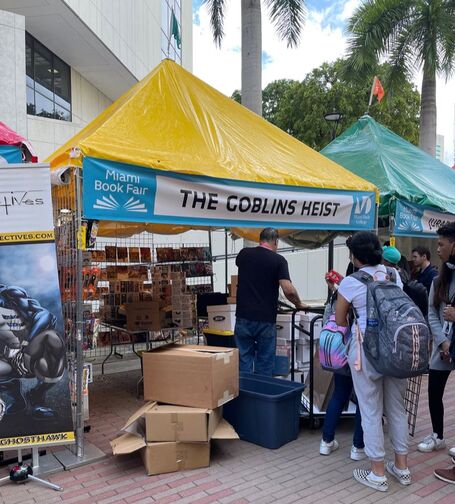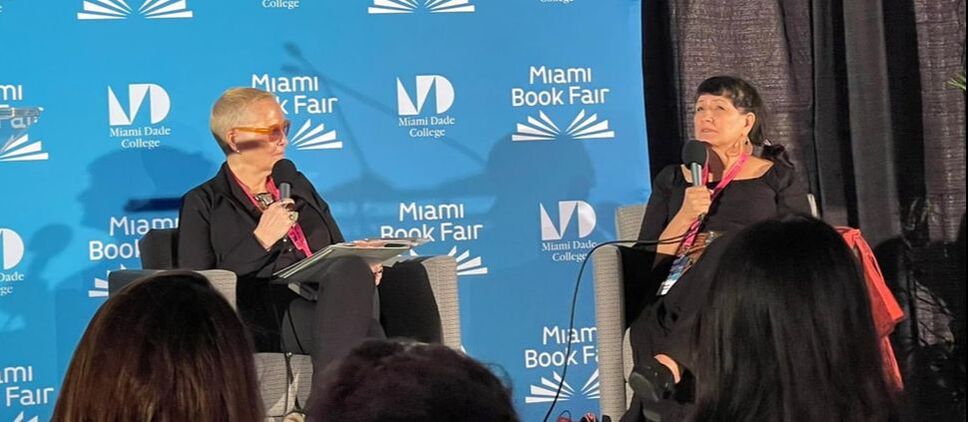Miami Book Fair 2021 Blog
Join us in person or from afar
EDITOR'S NOTE: This blog is posted with newest items at the top of the left column. Many panels are available online, even after the Fair, and we've linked to those panels below.
Sunday, Nov. 21, 2021
Sunday, Nov. 21, 2021, 7:11 PM
Did Jeffrey Epstein commit suicide in a New York jail? Julie K. Brown (Perversion of Justice: The Jeffrey Epstein Story) thinks not. It makes no sense medically—Epstein couldn’t have broken his own neck in that fashion. Or operationally—two guards and a camera system had to take naps at the same time. Or psychologically—Epstein thought himself above the law and that he could con anyone. Hardly the suicide type. “This is a man who never does anything on his own. If he wanted to die, he would have hired someone.” So who is responsible for Epstein’s death? Given that the jail cell was never really processed as a crime scene, we may never know. Brown said that conspiracy theories may persist for decades. Will Brown continue to cover the Epstein aftermath? After four years of investigation exposing Epstein’s exploitation of young women and girls, Brown said she’s ready for a new beat and challenge, another not-understood story. She’ll leave the work unraveling the roles of Epstein’s financial and social enablers to other colleagues. She is covering the Ghislaine Maxwell trial, but as an out-of-towner doesn’t get a press pass. (You can find the panel on demand here.) —Bob Morison Sunday, Nov. 21, 2021, 6:56 PM
Before the panel on Mango and Peppercorns: A Memoir of Food, an Unlikely Family, and the American Dream, co-author and co-restaurateur Katherine Manning is in the audience, to greet us and pull us closer to the stage. Her enthusiasm spills over into the presentation. Tung Nguyen ended up in Manning's home after fleeing Vietnam in 1975. Tung was pregnant, but together they raised her daughter Lyn (now the third co-author of their book) and founded acclaimed Miami restaurant Hy Vong, whose name means "Hope" in Vietnamese. As the Q&A started, it became clear the audience was full of fans of Nguyen & Manning's cooking, and also of their book—one audience member described reading it with her own immigrant family, and unlocking their own stories, drawing them closer. Her recollection brought Lyn Nguyen, and many in the audience, to tears. (You can find the panel on demand here.) —James Barrett-Morison Sunday, Nov. 21, 2021, 6:44 PM
Julie K. Brown describes the original Jeffrey Epstein case as a “total, horrible failure of the criminal justice system.” Epstein was convicted in 2008 on two counts of solicitation of prostitution (when the Feds had already identified dozens of victims). He'd orchestrated a most lenient plea deal and “non-prosecution agreement” signed off by Alexander Acosta, then U.S. Attorney for the Southern District of Florida. When Donald Trump appointed Acosta as Labor Secretary, the department responsible for combatting human trafficking, Brown knew she had to get on the case. —Bob Morison Sunday, Nov. 21, 2021, 6:20 PM
Julie K. Brown (Perversion of Justice: The Jeffrey Epstein Story) is being interviewed by Karen Rundlet, the Knight Foundation Journalism Program Director. The opening questions are about Brown’s background and career. Like so many good writers, Brown found outlets in reading and writing from a young age. Her first journalism jobs were with small Pennsylvania papers, including writing obits (good training), while moonlighting as a waitress to make ends meet. Her first break came with joining the Philadelphia Daily News, where she covered crime of all kinds and developed her investigative skills, “finding out what the police don’t know.” —Bob Morison Sunday, Nov. 21, 2021, 5:49 PM
There was a big late-Fair turnout to see Cesar Beserra, author of Orange Blossom 2.0, read about the early history of Miami and its co-foundress, Mary Brickell. He was joined on the panel by Brickell's great-granddaughter, Bea Brickell, who shared funny anecdotes about her ancestor and other family members. Beserra admonished us that the story of Julia Tuttle, Henry Flagler, and the iconic orange blossoms was debunked many years ago, despite our romantic attachment to it. It also was one of many factors erasing the Brickells from their rightful place in history. For Flagler to bring his railroad to Miami, he had to go through Brickell's land in Ft. Lauderdale, and make joint deals with both her and the Tuttles. But Brickell ended up on the wrong side of Flagler and Tuttle both politically and personally. Beserra said his goal in writing the book was to elevate Mary Brickell to her rightful place as one of Miami's two Founding Mothers. —James Barrett-Morison Sunday, Nov. 21, 2021, 5:38 PM
After a 4:00 panel, I took a farewell stroll around the grounds. The Porch and Children’s Stage were both still packed and hopping. Exhibitors starting to close up shop. Author Solutions solves a packing-and-transport problem by giving away the remainder of its book inventory, and TooFar Media is following suit. Books available for a dollar elsewhere. Paid my respects to the Florida Dairy Association cow in Children’s Alley. Watched the Ammadiyya Muslim Community booths celebrate Fair’s end with a staff photo. The “blend bike” that mixes smoothies with pedal power is stationary. Finished the circuit with my annual arepa. Thanks to all the Book Fair staff and volunteers who make it happen, and thanks to the Sunday weather god for withholding the rain. —Bob Morison Sunday, Nov. 21, 2021, 5:15 PM
Les Standiford has written about captains of industry including Henry Flagler, Andrew Carnegie, and Henry Clay Frick. Now his stable includes P.T. Barnum, James Bailey, John Ringling and one of the most enduring enterprises of the 20th century. In Standiford's boyhood in smallish-town Ohio, the biggest event of the year was the arrival of the second-string, one-elephant circus, and the biggest dilemma whether to spend his extra quarter on a sideshow. His fascination continued, to the point of attending the final Ringling Bros. and Barnum & Bailey Circus performance at Nassau Coliseum in 2017. Battle for the Big Top chronicles the origins, consolidations, and slow decline of the circus in the face of movies, TV, and other on-demand entertainment. Standiford says the essential ingredient of the circus is its impossibleness, from the death-defying trapeze to the elephant ballet, and the accompanying affirmation that "anything is possible” in America. Nicholas Griffin’s The Year of Dangerous Days describes a more chaotic three-ring circus, in 1980 when the McDuffie race riots, the Mariel boatlift of Cuban refugees, and the overflow of drug money quickly changed the face and power structure of Miami. Murder, corruption, and money laundering reached epic proportions. Griffin says his book isn’t all bad news—it’s also about "how to rescue a city that’s absolutely down on its knees.” (You can find the panel on demand here.) —Bob Morison Sunday, Nov. 21, 2021, 3:58 PM
In the Q&A at the Hear Us: Writing from the Inside During the Time of COVID panel, Kathryn Nowotny shares a stunning fact: Florida was both the last state to offer Covid-19 vaccination to prisoners, and the first to stop tracking data on the pandemic in the state's prison system. Angel Sanchez adds that, in tracking data on the pandemic, there are hundreds of correctional systems across federal, state and county governments, and Nowotny's independent organization is the only one collating that data—no government institution is doing so. —James Barrett-Morison Sunday, Nov. 21, 2021, 3:58 PM
At the powerful panel on Hear Us: Writing from the Inside During the Time of COVID, the audience keeps gasping—at the astounding facts about life in Florida's and the country's prison system during the pandemic, and at the beautiful writing by those within the collection. Kathie Klarreich, founder and director of Exchange for Change, which brings teachers of writing into the correctional system in South Florida, explained how the program's classes were shut down without warning in early 2020. When she sent out the call for submissions by current and former inmates, she says, "we were naive in our estimation... the diversity was tremendous," in writing style, opinion, and experience among the authors. In poetry and essays, with humor and sadness, the current and former inmates and their families sent in hundreds of texts. Angel Sanchez emphasized the title is "Hear Us, not Agree With Us"—as a microcosm of our society, the writers in the book don't always align even with each other. He read a piece by a prisoner with the job of prison law clerk who got Covid, derailing her from her position. Kathryn Nowotny, who researches the effects of the incarceration system on public health, said that the numbers and data are important, but "the human side is more important, and Hear Us brings that side." She said that "in a system designed to dehumanize, creative works are an outlet," and the book (and programs like Exchange for Change) provide that. But Klarreich noted that, because of restrictions, some in the book haven't even gotten a copy. The cover artist, who was released during the production process, has fallen completely off the radar. —James Barrett-Morison Sunday, Nov. 21, 2021, 3:45 PM
Despite having experienced more than a year of remote learning, remote working and remote everything, when I saw how many interesting conversations offered On Demand for the Miami Book Fair, knew that I wanted to check something out. I ended up watching an On Demand event titled "Three YA Authors on Remixing the Classics," which was a discussion between CB Lee, Bethany C. Morrow, and Chloe Gong, three young adult authors, about “remixing” and reinterpreting classics like Treasure Island, Little Women, and Romeo and Juliet. Each author had an opportunity to read an excerpt from their novel, and there was also a discussion in which they explored why they chose to remix the classics. Other topics of conversation included the importance of diversity and how their books could be used in schools. I’m glad that I was able to watch this particular session On Demand because this was an incredibly interesting discussion and I’d love to have the opportunity to revisit it time and time again. (You can find the panel on demand here.) —Jo-Anne Carrenard Sunday, Nov. 21, 2021, 3:30 PM
Unable to attend this year's Miami Book Fair in person, I am so grateful that a majority of the events have been available via livestream and On Demand. One of my favorite events was one that I watched through On Demand, the "Three Poets on Geography, Intimacy, and Dislocation" reading with Raymond Antrobus, Carlie Hoffman, and Tiana Nobile, hosted by John King. Having never read any of the poets on the panel, I was excited to experience poems as read by their authors for the first time. This event did not take place in person, all interviews broadcast through video calls. Raymond Antrobus, English author of All the Names Given: Poems, opened his reading by discussing his last name, art, and the color black in paintings. His poem "Plantation Paintings" begins with an image of his wife, Tabitha, as she examines a canvas painting in an empty gallery. As an artist, I resonated quite a bit with this evocative ekphrastic poem, and I plan to buy the book right away! Carlie Hoffman read from her collection This Alaska, a sprawling bookcase backdrop characterizing her reading wonderfully. She read with a lilting voice of "an Alaska of the mind," evoking images of a diner waitress wearing spilled coffee, winter and the Hunter's Moon as paths to heaven, and an oil-drowned seagull resting in the palms of her hands. Her poems seem to toe the line between reality and a dream-like consciousness. Yet another book to purchase! The final poet, Tiana Nobile, read from her new collection Cleave. She explained that the book was born from the all-too-familiar question Asian-Americans sometimes face: "where are you really from?" I was taken by the raw, visceral language, poems rooted deeply in the spaces between social commentary, nature, and human nature. Nobile's crisp reading captured me, and I plan to explore more of her work. After the reading, the three poets joined John King for a Q&A session. The writers engaged in conversations about their writing processes, early experiences with poetry, and the often-contradictory nature of modern poetry. Hearing poems read for the first time via video streaming isn't necessarily the most engaging experience, but it is certainly better than not being able to experience the reading at all. Most importantly, this event introduced me to poets I had previously been unfamiliar with, and I am quite excited to explore more of their work! (You can find the panel on demand here.) —AJ Leigh Sunday, Nov. 21, 2021, 2:50 PM
Adrian Matejka, past poet laureate of Indiana, read from Somebody Else Sold the World, his new collection written in record time because he had so much time on his hands during the pandemic. He said he thought the poems would be retrospective by now, but COVID isn’t over, and “we stay in place like furniture.” He's glad his book is in print ahead of the pack, because “a million pandemic poems are about to land on us.” The poems explore the surrealism of the pandemic and “the different kinds of masks” we wear. We've needed them as protection from a lot of bad news beyond the pandemic. Matejka read “Bullet Parts,” a swords-to-plowshares poem inventorying the better uses to which brass and lead can be put. Cordite, alas, “is only good for killing.” —Bob Morison Sunday, Nov. 21, 2021, 2:00 PM
This afternoon, on a bright and sunny November day in Miami, I attended In Conversation: On In the Pink: A Memoir with Nick Garnett, host of Miami Book Fair's Lip Service (on hiatus) and fellow Panther, and Clayton Littlewood, author of Goodbye to Soho. The two spoke for about an hour in a wide-ranging conversation that took audience members back to the heyday of the 90s gay party scene—from Provincetown to Fire Island to South Beach—with stories that were both funny and tender. Even for people like me who never experienced this time in history, Garnett and Littlewood were able to convey a sense of nostalgia for the time period that left me wanting more (good thing I bought the book!). Their discussion went beyond the parties, however, to include the AIDS epidemic, drug abuse, and the eventual implosion of the life Garnett built with his then-wife, and ended with some lively questions from the audience. (You can find the panel on demand here.) —Kristin Gallagher Sunday, Nov. 21, 2021, 1:23 PM
Decidedly straight guy becomes a regular on the non-stop, over-the-top, 1990s gay men’s party circuit in South Beach and far beyond. Sound like fiction? No, it’s In the Pink: A Memoir by Nicholas Garnett, dubbed by a friend “the gayest straight guy ever.” Garnett and Clayton Littlewood (Dirty White Boy: Tales of Soho) discussed those times with candor, empathy, and humor. Miami was the #1 destination for gay man of all kinds, but mainly buff and beautiful. The AIDS epidemic wasn’t under control, and people were determined to party—with drink, drugs, and each other—like mad while they could. Garnett read sections on several places: seeing and being seen on 12th Street Beach, whole-room dancing at the Warsaw Ballroom on Washington (now a Señor Frog’s), the Hombre (club of last resort), and New York’s Fire Island, aptly named “cauldron of bug-eyed excess without limits." He reflected on ways in which the gay scene, despite its intensity, was more natural and less edgy than the straight one, and how these days "the straight world has coopted the gay trimmings.” —Bob Morison Sunday, Nov. 21, 2021, 1:04 PM
Catherine Raven (Fox and I) incorporated her own layman's reading of Melville's Ishmael and Shelley's Victor Frankenstein into her book. Unlike many, she loved the characters: "When we put a book into the world, we have no control over how people interpret it." She now loves that readers will interpret her book in ways she never expected. Kristen Radtke (Seek You) then adds that in nonfiction "you set out with a question, but it's not always your job to answer it; it becomes a collaboration with the reader to do so." —James Barrett-Morison Sunday, Nov. 21, 2021, 12:44 PM
I always love the comics & graphic novels panels, but nearly all of them are virtual (along with most childrens & young adult literature). So I had to stop in to a panel with two excellent works of graphic nonfiction that deal with isolated people & places. Park ranger and professor Catherine Raven's Fox and I: An Uncommon Friendship illustrates her years-long friendship with a fox who took up residence outside her rural Montana cabin. She set the scene for us: a cabin on the high semi-desert, with less than ten inches of rain a year. Why do people choose to live in such desolate landscapes? "Not because we don't like people," Raven says, "but beause we love the things that people destroy." Kristen Radtke read a segment from her book, Seek You: A Journey Through American Loneliness, that explained the development of the laugh track. Originally made to better control laughter on live-taped radio and television, it developed into a way to simulate a viewer's place in an imagined live audience. Radtke has long been fascinated by those who are alone in public space, and began writing this book to combine it with those who experience loneliness even in the face of a society constantly emulating connection. (You can find the panel on demand here.) —James Barrett-Morison Sunday, Nov. 21, 2021, 12:00 PM
In this on-demand panel, "Modern Caribbean Fiction: Power, Disaster & Rebirth", writer M.J. Fievre served as the moderator for her fellow Caribbean writers, Cherie S.A. Jones (Barbados), Myriam J. A. Chancy (Haiti), and Asha Bromfield (Jamaica). Cherie S.A. Jones is the author of the debut novel How the One-Armed Sister Sweeps Her House. Myriam J. A. Chancy’s most recent novel is What Storm, What Thunder. And Asha Bromfield’s debut novel is Hurricane Summer. Fievre first asked the panel to describe their writing process. Jones, Chancy, and Bromfield all described the development of their novels as being character-driven. Jones explained how her character Lala started talking to her on a bus ride and how she then wrote through the night of the character’s appearance. The conversation then took a spiritual turn, with each author describing writing as more of a transcendent than a mechanical process. Chancy and Jones spoke of the conversations they had with their characters to finish their stories. And Bromfield shared how she called to her ancestors for assistance while writing. Fievre concluded the panel by asking the authors to consider their characters' relationships to power versus empowerment. Bromfield shared that her novel turns when the character, Tallia, stands up for herself to her powerful aunt. Jones spoke of exploring agency and the power of traditionally powerless characters. And Chancy shared how she presented the land of Haiti as a powerful but benevolent character that was willing to work with its human inhabitants for good or for ill depending on a person’s intention. —Yael Aldana Sunday, Nov. 21, 2021, 11:22 AM
A pair of novelist-lawyers with terrorism stories kicked off the Sunday program in the L-shaped room 2016. Charles Lichtman said he has been studying terrorism ever since the 1972 Munich Olympics, when an Israeli relative fortunately missed the trip. The Sword of David centers around the reappearance of the Ark of the Covenant and the Ten Commandments. Lichtman described all the travel and research informing his book, including being granted an unpecedented three-day interview with Carlos the Jackal. Twenty: A Jack Swyteck Novel is James Grippando’s 29th novel. The title refers to the 20th anniversary of 9/11, a sensitive topic and a problem for the author. His serial hero is a criminal defense lawyer—how can Jack Swyteck defend a really bad guy? Grippando figured out an angle. Lichtman and Grippando traded stories on where they were stranded on 9/11 (Arizona and Australia, respectively), how way-too-long their first drafts have been, and how lawyering experience helps with the research and preparation phases of writing. Grippando observed that, with the ubiquity of Law and Order and other legal dramas, readers’ sophistication about the law continues to increase. That makes things easier, because the author can do more and explain less, and harder, because readers can spot errors. (You can find the panel on demand here.) —Bob Morison Sunday, Nov. 21, 2021, 9:51 AM
Today's forecast called for more rain, but the blue sky is peeking through as I arrive at the Red Entrance this morning. Here's hoping that the weather holds, and we have a beautiful and sunny Book Fair Sunday! —James Barrett-Morison Saturday, Nov. 20, 2021
Saturday, Nov. 20, 2021, 7:10 PM
Anjanette Delgado, editor of Home in Florida: Latinx Writers and the Literature of Uprootedness, invited seven of her contributors to read from their pieces and discuss the collection's themes. Florida’s accomplished and acclaimed community of Latinx writers have been displaced from Cuba, Puerto Rico, Haiti, and many other places. There’s continued attachment to where they come from but a persistent question: Can one ever return to a home that existed in a different time and different circumstances? The writers’ approaches to the question ranged from memoir to metaphor. We heard about a formidable abuela with the formidable advice that “You can never be too smart.” A Cuban boy wanting so much to be more American through tokens he didn’t understand. The endless wait (and all the imagined ways) for Fidel to die at the hands of former Watergate burglars. Cuba defined as “a collection of my parents’ memories.” A common theme among the authors was somehow feeling at home in the variety and insanity that is Miami. (You can find the panel on demand here.) —Bob Morison Saturday, Nov. 20, 2021, 7:07 PM
Both Miriam J.A. Chancy (What Storm, What Thunder) and Dr. Guerda Nicolas said they're tired of the term "resilience" being used (by journalists, book reviewers, and the public) to describe the people of Haiti in the aftermath of the 2010 (and this August's) earthquakes. Chancy prefers "persistence," because "no human is made to bounce back from this kind of cataclysm... but instead some have no choice." —James Barrett-Morison Saturday, Nov. 20, 2021, 6:40 PM
Miriam J.A. Chancy's novel What Storm, What Thunder is written in ten voices, capturing both Haitians on the ground and expatriates to illustrate life before, during and after the devastating 2010 earthquake. She says she married her academic knowledge and research with the human element, and drew from her dreams to find the inspired voice of the characters. Some speak in first person, telling their own stories; some, like a mother in the midst of depression and grief, are told in third person. The novel is also non-chronological, to "give a sense of the fracturing of time" brought about by the rupture of the earthquake. And she encouraged the reader to take pauses—co-panelist Dr. Guerda Nicolas suggested gardening—to digest the sometimes heavy material in the book, and also recommended a playlist she curated to go along with the novel. —James Barrett-Morison Saturday, Nov. 20, 2021, 6:10 PM
Introducing Myriam J.A. Chancy and her novel What Storm, What Thunder, Dr. Guerda Nicolas says she is one of three authors she will always read. "Books, articles, they could write on a milk carton and I'd seek it out and read it!" She even changed her flight in to be able to host the panel, and her enthusiasm is infectious, with the audience already on the edge of our seats to hear their conversation. —James Barrett-Morison Saturday, Nov. 20, 2021, 5:10 PM
Despite the burst of rain, arepas were still available at the stand by Writers' Row. Snagged my one arepa of the fair. Delicious as always. —James Barrett-Morison Saturday, Nov. 20, 2021, 4:36 PM
Lots of booths are packing up or pulling down their panels as the wind-driven rain picks up. To protect precious books, presumably, and as potential customers take shelter under awnings or in panel rooms. —James Barrett-Morison Saturday, Nov. 20, 2021, 4:17 PM
Always fun to check out the titles on Writers’ Row, where authors promote and sell their individual wares. This year’s best children’s book title is a tie between The Grody Gang of Mosswoods and The Adventures of Chi-Chi the Chinchilla, back to the Fair in hardcover with a companion line of plush toys. There’s serious promotion behind a couple of business books. A timeliness prize goes to The Self-Employed Life. But punctuation demerits go to Skyscraper M.A.N.A.G.Ement (the promotional materials add another period after the E). Turns out the title is a punctuated acronym: M for “meaning,” A for “acumen,” and so on. Finding a G word must have been trouble, because it went to a sub-acronym, G.S.D. for “getting stuff done.” Like proofreading maybe? A couple of titles listed in the Fair Guide I couldn’t find, which is too bad. I was hoping that What’s in the Way of Your Happiness? would be next door to What’s Your Joy? duking it out over whether the glass of life is half full. Present but unfortunately not adjacent are The Reflections of Your Mirror and The Wild Woman. So this year’s proximity award goes to Redefining Normal next door to Multiverses. —Bob Morison Saturday, Nov. 20, 2021, 3:33 PM
Little is known about the life of Marie de France. Possibly noble, she had a connection to the court of Henry II and Eleanor of Aquitaine. She was exiled to an Abbey in England. She is the first published woman poet in French, writing lais, or short stories in verse. But that’s plenty for Lauren Groff to run with in Matrix: A Novel. There was a good crowd in the Auditorium for an entertaining conversation between Groff and Book Fair co-founder Mitchell Kaplan, plus Groff reading an episode where the novice Marie accompanies the Abbess to a remote village to perform the ritual exorcism of a fallow field. Medieval mystical to the max. Groff describes the Abbey setting as an "island of women” whose writings and lives are subversive to the hierarchy and patriarchy of the Church. She talked about researching and imagining times when, for example, there were no clocks to tell the time, and one nun had the specific job of remembering what happens when throughout the year. “Matrix” is from the Latin for “mother” and “womb,” and Groff won the battle with her publisher to give the novel that fitting title, Keanu Reeves and The Matrix notwithstanding. (You can find the panel on demand here.) —Bob Morison Saturday, Nov. 20, 2021, 3:03 PM
Their booth was added so last-minute that it doesn't even have a sign, but business is still hopping at Teca's Plants. Quite the crowd as I first strolled by. Makes sense to me that the book-lover and potted-plant-lover communities have quite the overlap—who doesn't love to curl up with a good book next to a window and some greenery? —James Barrett-Morison |
2021 Miami Book Fair Online Features
All the virtual events this year can be seen via the Miami Book Fair Online website at miamibookfaironline.com. Note that some Book Fair promotional materials link you to an alternative address at miamibookfair.com, but to view virtual events you must use the miamibookfaironline.com site.
In addition, limited events are being held in-person, but require tickets to be guaranteed seating. And the beloved street fair is back this year! To find information on all of this year's events, check out the downloadable fairgoers' guide via the MBF website. The FBR Blogging TeamReporters
James Barrett-Morison (Reporter and Editor) Giselda Aguiar Yael Aldana Jo-Anne Carrenard Kristin Gallagher AJ Leigh Bob Morison Madari Pendas Photographers Lynne Barrett Rosa Sophia Godshall More bloggers will be listed as contributions come in. Saturday, Nov. 20, 2021, continued
Saturday, Nov. 20, 2021, 2:32 PM
It's a windy day here at the fair, although the rain has mostly held off so far. To get out of the wind I ducked into the shelter of Glover's Books. Their booth, a classic at the Fair, is set up with shelves of books all around, lit inside by muted red lamps. It gives the classic works, nonfiction & esoterica within an otherworldly feel. —James Barrett-Morison Saturday, Nov. 20, 2021, 2:11 PM
Short lines in the food court as I stroll by. It could be because of the court's positioning tucked behind Children's Alley, or the short list of offerings this year: Thai, barbecue, and arepas of course. Or it could just be the lunch rush has wrapped up. —James Barrett-Morison Saturday, Nov. 20, 2021, 1:43 PM
Art historian, social worker, minister, and writer Catherine Wolff said she takes an anthropologist’s perspective in Beyond: How Humankind Thinks About Heaven. The book explores competing views of the afterlife—and how to get there—across Western and Eastern traditions. Do we evolve through many lives—or have one shot at heaven? Are we saved or predestined? Are there deities and are they judgmental? Is heaven a different place, or a different dimension here? Wolff said that when she began the book project she had no idea how complicated the research would be or how much time she would spend arguing with herself. The common threads are that people yearn for an afterlife, and what we do in this life has an effect on where we’re headed. There may be different heavens for different people—you find what you seek. I asked how much her history of heaven does double duty as a history of hell. Wolff said that hell seems to be a much bigger and better documented (in one case to the tune of 25 volumes) topic. —Bob Morison Saturday, Nov. 20, 2021, 1:04 PM
In his talk, David Zucchino demonstrated why his new book, Wilmington's Lie: The Murderous Coup of 1898 and the Rise of White Supremacy, won this year's Pulitzer. He spoke deftly and incisively about the 1898 Wilmington coup, a putsch against the city's multiracial government by white supremacists in the post-Reconstruction south. Zucchino's goal in writing about the coup was to understand why such a violent event, in which 60 were killed and nearly the entirety of the city's Black majority was driven out, is almost unknown today, even among historians and North Carolina residents. He noted that the "victors wrote history" in this instance, and read from North Carolina school textbooks of the mid-20th century, which warped the event into an act of vigilante justice, or barely covered it at all. No one was ever held accountable for the overthrow, and its perpetrators retained control of the city government for decades; commemorations only began a hundred years later in 1998. Interviewer Gilbert King asked about parallels to today, and their conversation quickly turned to the events of January 6th this year. Zucchino compared the two, each led by a demagogue (in the case of 1898, the newspaper-publisher-cum-politician who rallied the city's white residents) who used racist rhetoric and remarkably similar phrasing around "taking back our government." (You can find the panel on demand here.) —James Barrett-Morison Saturday, Nov. 20, 2021, 12:00 PM
Three Writers on History, Hardship, and Healing was one of the Miami Book Fair’s On-Demand programs, which included authors Ruth Behar (Letters to Cuba), Saadia Faruqi (Yusuf Azeem is Not a Hero), and Jasmine Warga (The Shape of Thunder). The event was moderated by Maggie Collins and Harmony. Each of the books was written for a middle grade audience and features a young protagonist between the ages of 11-13 confronting different issues. In Yusuf Azeem is Not a Hero, the titular character deals with anti-Muslim sentiment in his small town in Texas following the twentieth anniversary of the September 11, 2001, terrorist attacks. The Shape of Thunder follows two best friends after a school shooting and their traumas. And in Letters to Cuba, a Jewish girl immigrates to Cuba to escape anti-Semitism in Europe and build a new life. Since all the books touch on trauma and coming-of-age, one of the questions was "what is your advice for children dealing with hardship?" Behar’s answer integrated the ideas of community building and inter-generational conversations to understand the multiplicity of pain. For Warga, whose novel was inspired by a conversation she had with her kindergarten-aged daughter about a lockdown drill, she said, "It’s important to balance hope and honesty." Warga wanted to respect the intelligence of her audience by presenting the issue of gun violence truthfully, but also alongside ideas of hope and things getting better. Warga shared an additional anecdote that a source of inspiration came when she did school visits and noticed how the environments were designed with this awareness of constant threats of violence. Similarly, Faruqi spoke about her relationship with her children: "I talk to them about everything." She echoed Warga’s sentiment of writing honestly without making the content over traumatic, so children can talk about it. When talking about having children as main characters, Faruqi shared that it was important for young people to realize they have power and can make changes in their community, even if the action at the time seems small. Behar added, "All children have a magic power." The conversation closed with each writer sharing what their next projects are and the ways in which they are continuing the activism begun in their books. (You can find the panel on demand here.) —Madari Pendas Saturday, Nov. 20, 2021, 11:18 AM
Sandy Sheehy (Imperiled Reef: The Fascinating, Fragile Life of a Caribbean Wonder) took me back to my youth in Arizona. Talking about ways to be environmentally conscious while maintaining quality of life, she sang the praises of evaporative coolers (a.k.a., swamp boxes) as cost-and-energy-efficient alternatives to central air conditioning. Swamp boxes operate by dripping water through side panels made of straw-like stuff, and blowing air through them. In arid Arizona (or New Mexico, where Sheehy lives during the summer), they can lower the temperature by about 15 degrees while mercifully injecting some humidity. Alas, they don’t work so well in Miami or other places where the humidity is oppressive to begin with. —Bob Morison Saturday, Nov. 20, 2021, 11:10 AM
Sandy Sheehy begins her talk with a commercial for the lionfish. An invasive species, damaging ecosystems from Florida to Brazil, it has venomous spines "but tastes delicious—eat all the lionfish that you can!" Co-panelist Cynthia Barnett chimes in with, "You can even find it at Publix sometimes!" Sheehy's book, Imperiled Reef: The Fascinating, Fragile Life of a Caribbean Wonder, is about the Mesoamerican Barrier Reef. Stretching from Cozumel to Honduras, it is the second-largest coral structure in the world. The reef is home to creatures from tiny, translucent coral polyps up to huge, plankton-eating whale sharks. Sheehy emphasized the shift from traditional conservation, which prioritizes the preservation of pristine wilderness for the enjoyment of the wealthy, to the end of ecocolonialism. New conservation incorporates the accumulated wisdom of indigenous and local peoples, and their stewardship and economical preservation of natural treasures. She gave the example of helping locals on the coast of Mexico train scuba divers on how not to damage the reefs with dragging gauges or flapping flippers. At one point, Sheehy and Barnett held up their waters—rather than the standard panelist bottled waters, they had opted for Miami tap water in colorful Book Fair mugs (available here at the Fair!) —James Barrett-Morison Saturday, Nov. 20, 2021, 11:02 AM
Cynthia Barnett (The Sound of the Sea: Seashells and the Fate of the Oceans) focused her talk on seashells as the means to understand our environmental past and anticipate our environmental future. We have to recognize that “the oceans have saved us so far" by trapping so much excess heat. She also talked about our pure fascination with seashells, especially among the Victorians. There were shell cameos for the Queen, shell jewelry for the middle classes, and elaborate shell-lined grottoes in the homes of the ostentatious. The founders of Shell Oil were the sons of Samuel Marcus, who devised those little boxes covered in tiny shells. —Bob Morison Saturday, Nov. 20, 2021, 10:32 AM
Cynthia Barnett, author of The Sound of the Sea: Seashells and the Fate of the Oceans, told us that she, like many, is drawn to seashells, holding them up to our ears "to seek wisdom in their polished whorls." Barnett's presentation introduced shells as the "world's great fact-checkers," telling scientists and human historians about our past, present and future. Shells proved that neanderthals weren't "hulking brutes," but used them to make aesthetic jewelry a hundred thousand years ago. Today, shell-building animals' "reliance on minerals makes them sentinels of what is going on in the ocean," from the heating brough by climate change to ocean acidification, which makes it harder for creatures to construct their shells out of calcium carbonate pulled from the water around them. "As a science writer," Barnett says, "I aim to balance warning with wonder," both illustrating the challenges our oceans face and giving hope and solutions. (You can find the panel on demand here.) —James Barrett-Morison Saturday, Nov. 20, 2021, 10:09 AM
At my first panel of this year's Fair, we had a surprise appearance! Mayor of Miami-Dade County Daniella Levine Cava was here to introduce the panel's authors, Cynthia Barnett and Sandy Sheehy. In her "water warrior jacket," she told us of her passion for South Florida's waterways and how thrilled she was to introduce the authors, who have books out about the environmental impacts of shellfish, oceans and reefs. —James Barrett-Morison Saturday, Nov. 20, 2021, 9:44 AM
Was I eager for the start of the Book Fair, or what? First sessions are at 10:00, but arrived at the gates' opening bell at 9:00. The better to survey the Street Fair as exhibitors were opening up and then visit the Friends of the Fair Lounge. The exhibitor tents go one block in each direction form the crossroads-of-the-fair intersection at NE 2nd Ave and 4th St. Good to see Glover's Bookery, last vestige of the Antiquarian Annex and go-to place for old/rare/classic used books. And Akashic Books, purveyors of the noir series including Miami Noir and Miami Noir: The Classics. First-time exhibitors include local institution Sweat Records. The Lounge, upstairs at Tuyo with great views, offered the usual continental breakfast, packaged rather than help-yourself in deference to pandemic protocols. Same friendly place to take a break from the Street Fair fray. —Bob Morison Friday, Nov. 19, 2021
Friday, Nov. 19, 2021, 12:00 PM
Like the food court, the Porch has also changed locations this year. You can find the Porch between Buildings 1 and 2. Although the Porch doesn't officially open until tonight, I heard what must've been rehearsals right before it started to rain again. If you plan on attending the Fair, like always, make sure to bring water and an umbrella. —Giselda Aguiar Friday, Nov. 19, 2021, 11:40 AM
The food court is located behind the Children's Alley this year. Although there are arepa and lemonade stands throughout the Street Fair—plus a few booths selling snacks and other small items such as smoothies, cookies, and honey—there are only four proper food stalls in the food court. I didn't notice any area set up for sitting and eating, but I was in a hurry to leave the heat and return to my office. Between the rain and the heat, eating outside is not an ideal choice today. —Giselda Aguiar Friday, Nov. 19, 2021, 11:25 AM
There are definitely fewer stalls compared to previous years, but familiar ones, such as Support Children's Literacy Books for $1 and Glover's Bookery, are back. Sadly, the tent for Gables Delight Jam and Jellies has its flaps down, so I was unable to stock up on guava and strawberry jams during my lunch break. I thought the tents would be spaced out with the advent of COVID, but they aren't. The only times I stood under a tent were to get a momentary respite from the sun, but I did not want to linger too close to others, especially because most of the vendors I saw were not wearing masks or keeping a distance from buyers. Masks are not mandatory at the Fair. Children's Alley is still being set up for tomorrow. Tents in this area are more spaced out. —Giselda Aguiar Friday, Nov. 19, 2021, 11:15 AM
It was raining until recently, but the sun is out and strong, with no signs of the rain left. —Giselda Aguiar Friday, Nov. 19, 2021, 11:09 AM
Since there are no school field trips to the Book Fair this year, I thought I wouldn't see any groups of teens on the Friday of the Street Fair. I was wrong. New World School of the Arts is located at Miami-Dade College Wolfson Campus, where the Book Fair takes place, so, naturally, many of its students are visiting the Street Fair. Sure, there isn't the swell of students I saw two years ago on that Friday of the Street Fair, but there are still plenty of students walking in groups, going from tent to tent, and queueing to buy food. One already popular booth with the teens is The Goblins Heist, which has comics and Funko Pops. Like this booth, many booths are still unpacking and readying themselves for visitors. Some are completely set up while others are still vacant, waiting for tenants and goods to arrive. —Giselda Aguiar Thursday, Nov. 18, 2021
Thursday, Nov. 18, 2021, 9:05 PM
The Street Fair starts tomorrow! Unlike previous years when Friday—the first day of the Street Fair—is a day when local schools can bring students, this year there will be no scheduled field trips. Additionally, booths will only be open from 11 a.m. to 3 p.m. on Friday. —Giselda Aguiar Wednesday, Nov. 17, 2021
Wednesday, Nov. 17, 2021, 2:00 PM
An Evening with Sandra Cisneros & Jan Beatty: On Maritita, I Remember You / Martita, te recuerdo was an in-person event to support Cisneros’s new novella. The evening started with Cisneros introducing the people there to support her, including Ruth Behar, fellow MacArthur award winner, author Edwidge Danticat, and the Inaugural Poet Richard Blanco, who received spontaneous applause from the audience. Beatty and Cisneros are long-time friends, and their conversation was like eavesdropping. When Beatty declared Cisneros’s new book to be a novella, Cisneros disagreed, saying that she did not know what it was and that it was simply a story, but that the publishers had to label it as something. Beatty asked Cisneros to repeat also a poignant anecdote they had spoken of together. Cisneros relayed a story about sharing Reese's Peanut Butter Cups with an unpopular classmate in the seventh grade. Cisneros stops herself midstory and says, "I have to write it down, or it didn’t happen." The event was outside, and it started to drizzle, but the audience stayed put. Then we collectively gasped as the fabric background fell forward on the authors. Fortunately, it was very light, and Beatty caught it with one hand before the event staff put it back in place. The evening ended with questions and answers. I asked how The House on Mango Street came to be published by one of the big five publishers, as it was a very revolutionary book. Cisneros answered that a small press first published it but that her agent really believed in the book and worked for ten years to get it accepted at a major publisher. Cisneros stated that she believed her agent’s efforts changed the industry. —Yael Aldana Tuesday, Nov. 16, 2021
Tuesday, Nov. 16, 2021, 9:15 PM
Craig Pittman and Tyler Gillespie read from their new books and interview each other in this on-demand event posted today. Gillespie’s The Thing about Florida: Exploring a Misunderstood State explores and embraces the people behind the strange stories, from cattlemen to python hunters. Once embarrassed to call Florida his home, and misunderstood himself growing up gay in a Southern Baptist household, he covers the diversity of Florida’s people and the difficulty of its problems, starting with climate and environment. Craig Pittman has been on the Florida strangeness beat for decades (see my FBR review of Oh, Florida!). He was at last year’s virtual Book Fair with Cat Tale on saving the Florida panther. He’s back, clad Florida-formal in black shirt with pink flamingoes, with The State You’re In: Florida Men, Florida Women, and other Wildlife, a collection of his Tampa Bay Times and other columns. The opener is on the mermaid industry, Florida being the only state with mermaids on the payroll and official expenditures on waterproof lipstick and shell bras. Those at Weeki Wachee State Park are best known, but Pittman finds mermaid outposts all over the state, the closest to Miami at the Wreck Bar in Ft. Lauderdale. And there’s a support industry, headlined by the Mer-Tail-er who fashions custom (and expensive) mermaid tails. Some of Pittman’s pieces salute Florida storytellers, including John D. MacDonald, Elmore Leonard, and Charles Willeford, “godfather of the whacky Florida crime novel." Both authors advocate more coverage of Florida history in the schools. Pittman: “If the Pilgrims had headed south, they could have spent that winter in a St. Augustine hotel.” (You can find the panel on demand here.) —Bob Morison Tuesday, Nov. 16, 2021, 9:02 PM
This morning, the process of positioning the tents for this year's Street Fair began. These tents haven't been out since November 2019. —Giselda Aguiar Tuesday, Nov. 16, 2021, 4:17 PM
Larry Baker discussed his new novel, Wyman and the Florida Knights, with FBR editor Lynne Barrett. Wyman is a famous portrait painter who has lost sight of himself. The Knights are a family that has controlled a small Florida town for 150 years. The last of the Knights has made millions off the land holdings, but it’s a Faustian bargain and the land really owns him. Knightsville is an isolated place—the world has gone by and doesn’t come in. That’s the backdrop for the contemporary family story in which everyone is seriously flawed. Baker said that the two main women characters grew on him and gained importance as he wrote the book. One is a Knight who runs the local newspaper that chronicles the town. The other is an in-law whose resume includes stripper, swinger, and nurse. Both act as foils revealing how screwed up the men around them are. Baker and Barrett discussed the several ways that the variety of characters are revealed: through different points of view so we see how characters perceive each other, through profiles in the local paper, and through their nicknames. No one goes by their given name. They also talked about the literary influences on the book's plot, tone, and sense of place. They include the Bible (a Cain-and-Abel situation), The Scarlet Letter, and To Kill a Mockingbird. Wyman and the Florida Knights ends on election night 2016 with what I take to be a cameo appearance. Baker said that, despite their flaws, everyone in the book has some redeeming qualities—except Donald Trump. (You can find the panel on demand here.) —Bob Morison Monday, Nov. 15, 2021
Monday, Nov. 15, 2021, 2:00 PM
John Lithgow is a prolific actor, children’s book author, and lately satirical poet. A Confederacy of Dumptys: Portraits of American Scoundrels in Verse completes his “Dumpty Trilogy” (with Dumpty: The Age of Trump in Verse and Trumpty Dumpty Wanted a Crown). Concerned about how things were turning darker, Lithgow was determined not to write a third book until his historian wife Mary Yeager suggested a variation on the theme—writing about Trump’s predecessors. The scoundrels on parade include Andrew Jackson, Nathan Bedford Forrest (first Grand Wizard of the KKK), George Armstrong Custer, Trump’s tutor Roy Cohn, Spiro Agnew, and Bernie Madoff. Lithgow said that women are relatively rare among American history’s villains, but Typhoid Mary, Leona Helmsley, and Sarah Howe make the cut. Lithgow is especially fond of his lesser-known subjects—Howe ran multiple pyramid schemes preying on wealthy widows decades before Ponzi. Another favorite is the poem titled “Nasty Business: The Tale of Boss Tweed,” the rapacious politician done in by the political cartoonist Thomas Nast. Recent lesser lights in the realm of darkness—Cruz, Giuliani, Goetz, Graham, McConnell—merit only limericks. Lithgow said that writing the books showed him that “satire is important, if not essential.” This is a solo performance, recorded with no interviewer, just Lithgow “talking to myself” most entertainingly. “I may be an amateur poet, but I’m a professional performer.” And a clever lyricist in the best Broadway tradition. He read a half dozen poems and offered teasers on others. He also illustrated the book (including the scoundrels' Mount Rushmore on the cover) and held several pages up to the camera for our inspection. Lithgow strongly recommends buying his book, and I strongly recommend watching this session (which you can find online here). Now I’ve got to look up John Romulus Brinkley, a.k.a., the Goat Gland Doctor. —Bob Morison Saturday, Oct. 30, 2021
Saturday, Oct. 30, 2021, 2:00 PM
First taste of Miami Book Fair 2021! As a special Halloween weekend treat, the Book Fair made available the on-demand discussion of a ghost story, No One Goes Alone, by Erik Larson. Larson is the author of a half-dozen nonfiction bestsellers, most recently The Splendid and the Vile, about Churchill during the blitz. This is his first foray into fiction, with a story conceived during a bout of book tour boredom. He is interviewed by novelist, screenwriter, and comics writer Benjamin Percy. Larson has always been a fan of ghost stories that make you “cozily scared” rather than totally terrified. His favorite is Shirley Jackson’s The Haunting of Hill House. No One Goes Alone is published as an audio original, both because ghost stories are best heard (you can even “read” it in the dark) and because Larson didn’t want to blur his non-fiction brand. He said that the narrator gave the story added dimension, reading sentences with different emphases from his own. Larson and Percy discussed how ghost stories are best delivered in short story or novella length, and how Larson had to suppress his nonfiction-writer’s fascination with detail: “You can’t clutter the fiction landscape.” But he indulged in the freedom of making up dialogue for a change. Still a nonfictioner at heart, he narrates his “source notes” at the end of the book. The story has roots in research done for Thunderstruck about late-Victorian fascination with the paranormal. Larson studiously avoided giving away much of the plot, but members of a society for psychical research gather on a remote island to investigate an eerily friendly haunted house. Random tidbits from the conversation: Larson’s wife expertly edits his near-final drafts with custom emoticons in the margins. Ghost stories can’t have footnotes (an early draft did). Try reading Goodnight, Moon in a really creepy voice. Let’s just say that the Book Fair is off to a great start. —Bob Morison |

